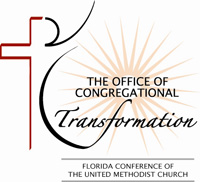 |
Congregational Transformation |
 |
Congregational Transformation |
|
THE FLORIDA ANNUAL CONFERENCE Living out the Great Commission… Matthew 28:16-20
The VISION of the Office of Congregational Transformation:
The MISSION of the Office of Congregational Transformation:
INTRODUCTION The Scriptures are quite clear on what the Church’s purpose is. It is to make, grow, and put to work disciples of Jesus. There is wide spread concern across our churches that we are not doing this job well. But there is every reason to believe that we have the faith, commitment, resources and will to succeed in God’s purpose! What is the way forward? TRANSFORMATION! The delegates to the 2002 Florida Annual Conference wisely created the Office of Congregational Transformation. The Office will help congregations assess their accomplishments in relation to the Church’s purpose, and help congregations transform and keep transforming their lives in ways that lead to success in making, nurturing, and nurturing disciples who make disciples who make disciples… When the existing system of congregational life is producing no or few new disciples of Jesus, and the average worship attendance is either declining or has shown no growth in a long period of time, the congregation is not fulfilling God’s purpose, the Great Commission. Conference statistics bear this out. Perhaps 300 of our 737 churches are declining or stagnating in terms of membership and attendance. We live in a state which continues to grow rapidly; it is an explosive 36 % over ten years in some areas. But even in undeveloped areas the population shows from zero to single digit increases. Our past attempts to help congregations more effectively make disciples have fallen short. The efforts have had merit and there have been significant accomplishments. But we have not succeeded overall. To be sure, we have allowed and even encouraged congregations here and there to make systemic changes, but we have not created the climate of expectation required to accomplish widespread transformation, from maintenance congregations to missionary congregations. The need for turn-around is clear and is apparent not only to the ones striving for it, but also to many others waking to diminishing return on their efforts. To change the results produced by a system the system must change. We have exhausted the capabilities of the systems many congregations are using. It is not simply a matter of "tuning up or tweaking" fundamentally sound existing systems. It is a matter of replacing inadequate ones. This new mindset involves a perspective that instinctively looks "out" at the community rather than "in" at the membership. This perspective will help us review our ministry approaches with an eye to, employing, discarding, or adapting old ways of doing things, and inventing many new ones. Such a Transformation will result in a major shift in the lives of our churches and the members of those churches. Interestingly, the congregations currently successful in making disciples are continually transforming their congregational life in response to the changes that are taking place in their neighborhoods. So in a real sense Transformation is an ongoing continuous process, a way of life, necessary for all congregations, not a program done once by some congregations. Transformation is fundamental change in the
congregation’s conception and implementation of ministry. A
transforming congregation will be oriented around mission to the
unchurched, nurturing them into the loving caring fellowship of Christ.
It will be notably different from one oriented primarily around
ministering to members. The congregation will meet the needs of members
but will never allow this to eclipse the primary ministry to the
yet-to-be-churched. BACKGROUND FOR LEADERS Here are some of the assumptions on which our Transformation leadership will be based
CURRENT REALITY →→→→→→→REALITY PICTURED IN CONGREGATION’S VISIONTransformation Process
THE TRANSFORMATION PROCESS This is subject to change as we experience more churches working through the process PREPARATION
· Create a Church Health Team using guidelines from Church Smart Resources’ Natural Church Development (NCD).· Assess the functioning of their ministries in relation to the Great Commission and the Great Commandment.· Commitment to a long term process (six to ten years) of Transformation.· Commit to a long term growing relationship between congregation and pastor(It is normative not to change senior pastors in this time period if at all possible.)
ASSESSMENT
IMPLEMENTATION
COACHES
NOTES
|